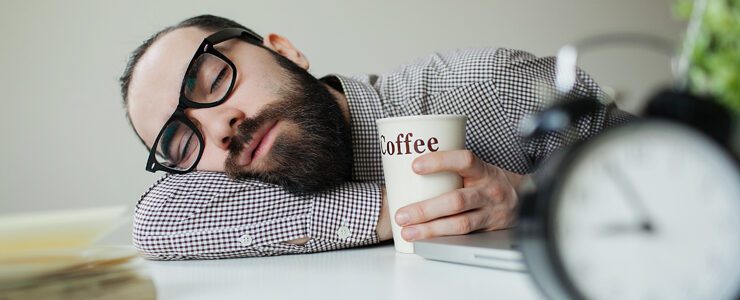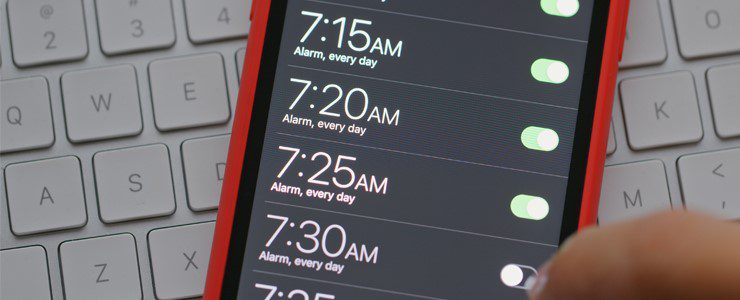
How to manage your workload after a bad night’s sleep
When you’ve had a bad night’s sleep, or simply not enough hours, the prospect of surviving a day at work can seem intolerable. Feeling tired and sluggish can have a number of detrimental effects. You will feel less creative and lacking in motivation. Remaining focused on projects may seem impossible and your productivity will dip.
Adults aged 18 to 64 need seven to nine hours of sleep a night, but 32% of working adults say they get less than six. Research reveals 20% of people have actually fallen asleep at work, according to a survey of 1,000 employees in various industries.
It’s largely office workers who tend to fall asleep in the workplace after a bad night’s sleep: sectors where more than 50% of employees have admitted nodding off at their desk include IT services, local government and administration, insurance, finance, data processing and information services.
Importance of sleep
Sleeping well is important not only to function in the workplace but also for our general health. When the neurons in our brain switch to a sleeping state, this launches a biological process that refreshes our mind and body. This boosts our immune and cardiovascular systems, improves our ability to learn new information and helps us to think clearly.
Lack of sleep will impact our well-being, including workplace performance. The neurons in the brain become overworked, impairing thinking, slowing reaction times and leaving us emotionally drained. Feeling so drowsy that we’re struggling to stay awake saps mental energy and completing tasks takes much longer than usual.
Our attention can lapse completely and we may be unable to complete the task at hand. A lack of sleep can cause irritability, anger and increased stress. Over a long period, it can lead to general cognitive decline.
Reasons for not sleeping
Different surveys suggest between 10% and 30% of adults have insomnia. Other reasons for not sleeping include working long hours.
Some people may have a medical condition that stops them from sleeping well, such as sleep apnoea or narcolepsy. Illnesses that require prescribed drugs or ongoing medical treatments can leave people tired. Stress and anxiety can also cause insomnia, whether it’s related to the job, financial problems or family issues.
Life events, such as having a new baby in the house, can be the most obvious cause of a lack of sleep. For adults aged over 40, 76% of women and 69% of men need to get up at least once during the night to use the bathroom.
Sleeping in a noisy environment, such as in a bedroom overlooking a main road with constant traffic, or hearing revellers returning from a night out, can disturb sleep. According to the National Sleep Foundation, people might not remember waking up during the night, but noises may have disturbed their sleep multiple times.
Keeping focus at work
The question is how to stay focused at work. You may feel tired and irritable, but don’t panic – remain optimistic. Treat it as just a bad night and don’t dwell on it. Think positive and remember that people are resilient to the odd night’s sleep deprivation and can bounce back quite quickly.
First, if you get up feeling tired, keep hydrated by drinking plenty of water. We feel more tired if we’re dehydrated, so drink a large glass of water with a healthy breakfast. Keep drinking water regularly during the day.
The caffeine in coffee, in moderation, can give you an energy boost and help to make you feel more alert. However, limit yourself to a couple of cups of coffee – say one in the morning when you arrive at work and one at lunchtime. Don’t overdose, as it will start to make you feel jittery and anxious.
Eating healthy foods
When overtired, some people rely on sugar for an energy boost, but don’t reach for carbohydrate-packed, high-calorie snacks. The sugar will provide a quick “sugar rush”, but it won’t last. Once it’s subsided, you’ll feel worse than ever.
Avoid a large lunchtime meal, sugary foods and energy drinks. Instead, eat healthily throughout the day, focusing on protein-rich food, such as lean meat and nuts. Eat a piece of fruit and continue to drink water, rather than having a coffee and a chocolate bar. Stick to a balanced, healthy diet instead.
Keep your day simple
Try to simplify your day. If you have an important meeting, see if it’s possible to reschedule it without inconveniencing colleagues. If you had six challenging tasks planned, try to pare them down to the three most important. Otherwise, you might not do any of them well. Focus on completing fewer tasks, as you’ll have more chance of working to a high standard. Don’t make any significant big decisions until you’re feeling better.
At lunchtime, go out for a walk and get some fresh air. Natural light and physical activity will help improve how you feel. Daylight helps our body to block the production of melatonin, the sleep hormone. Even on a dull day, a walk can be beneficial.
Take a power nap
Some people find a power nap beneficial, others don’t. In the US, the Miami-based financial company, Aegis Fin Serv Corp, introduced a “sleep pod” in 2014. It is said to boost morale and productivity. Almost two-thirds of employees use the facility on their breaks.
While a lot of UK employees might not have this luxury, if you have a staff restroom where it’s quiet, try eating a light, healthy lunch, take a brief walk outside and then try to relax. Limit your nap to 20 minutes at the most by setting an alarm. The best time to take lunch is between noon and 2 pm.
Flexible working
Being based in a flexible workspace, such as a coworking space, can benefit employees who’ve had a bad night’s sleep. It’s easier to reorganise your day’s schedule if you can change your start and finish times.
When based in a corporate office, it can be harder to adapt your workload, but being in a flexible workplace affords you the benefits of working to suit your own needs.
Sleep schedule
Finally, when you arrive home after a sleep-deprived day, don’t be tempted to go straight to bed. This could disrupt your sleep cycle further, as you may wake up in the early hours, after seven or eight hours’ sleep, starting the cycle again the following day.
Try having a relaxing bath, a warm drink such as milk and change your bed, as 78% of people feel more relaxed on fresh-smelling sheets.
© Katsiaryna Pakhomava / Shutterstock.com



